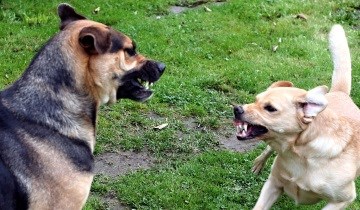Reporting and preventing biting incidents
If you or your dog (or other animal) has been bitten, you can report it. Both the Penal Code and the municipal APV (General Local Ordinance) contain rules that can be used to act against aggression by dogs. It is therefore advisable to report a biting incident to the municipality and/or the police.
It is important to report the biting incident as soon as possible after the bite occurred. This is because the chance that action can be taken against a dangerous dog is then greater. Therefore, we advise to call the police as soon as possible if your or your animal has been bitten. In less serious incidents, you can try to settle the matter with the owner of the dog, if the owner is open to it.
If you are in doubt or when you feel threatened, you can contact the police. In the case of less urgency or if you are in doubt contact the police on 0900-8844. In potentially acute and /or seriously threatening cases call 112. Make sure that the police always records your report.
You can also make a report to the animal police by calling 144. 'Meldpunt 144 Dierenpolitie' (Animal Police) can be reached at the following times at a local rate:
Mon to Sat: 8:00 am to 6:30 pm
Sun: 9:30am-6:30pm
If 144 is not available call the police number 0900-8844.
Always call 112 in case of emergency! (also if a person or dog is dangerously injured)
What to do after a biting incident
To properly handle a biting incident, you can follow the steps below:
Always record information.
It is important that you record the details of both parties. Think of the name, address, telephone number, e-mail address, WA insurance, breed, age and vaccinations of the dog. If there are witnesses, also write down their details (name, address, telephone number, e-mail address).
Write down the event.
Try to write down the situation as objectively as possible immediately after the incident. What did the dogs do? What have the owners, bystanders or any other animals done? How did the dogs, people or other animals react to this and what happened next? Describe the incident in detail. No detail is too much. Also consider the injuries, the location and whether the dog(s) were running loose. If possible, take photos and/or videos.
Settle the matter amongst yourselves.
This is possible in less serious incidents, the damage caused by the dog is in almost all cases covered by the owner's WA insurance (liability insurance).
Make a declaration or report.
In case of more serious incidents, you can file a declaration or report to the police. A declaration ("aangifte") can be made if a criminal offense has been committed according to the Penal Code. If, according to the police, this is not the case, you can still report it to the police. The police must always record this report (as a “melding”) and may not refuse it. Based on a report, steps can be taken on the basis of the municipal APV (administrative law). You can read more about legislation here (in Dutch).
Frequently asked questions about reporting biting incidents
Who do I have to report to?
If you want to file a report, you must always report this to the police.
Am I obliged to report a biting incident?
No, you are never obliged to file a report. But if you want to recover the damage from the owner of the biting dog, many insurance companies do require this. Also if you think that the dog or owner is a danger to society, or if you have no confidence that the owner will try to improve the behavior of his dog, it is wise to report it.
I want to report a biting incident, what should I pay attention to?
You should bring as much material as possible showing that there has been a biting incident by that specific dog.
The police do not want to record my report, can they refuse?
No, if it concerns a criminal offense (i.e. a crime or a violation), the police are obliged to record every report. If it is not a criminal offense, you can still always report it as a “melding” (notification).
My dog was seriously injured or bitten to death by another dog. The police say they can't do anything with it, is that right?
No, that is not true. You must be able to prove which dog bit your dog. Therefore, always take photos and/or videos on site (if it is possible and safe to do so), and ask for the names of people who saw the incident (the witnesses). If there has been a serious biting incident (whether to a human, dog or other animal), the government can act. The law states that this applies to a dog biting another animal as well as biting a human.
What can the government do?
The municipality can carry out a further investigation and summon the owner of the aggressive dog that he must keep his dog on a leash and/or muzzle. The dog can also be confiscated. The mayor will then decide what should be done with the dog (e.g. leash order, muzzle order, training, rehoming or euthanasia). The owner can take legal action against this, and sometimes it succeeds. So proof is always very important.
What can I do in case of an unjust report against my dog?
You can find a good lawyer and challenge the decision of the Ministry of Justice or the municipality. The correspondence you receive from either the Public Prosecutor or the municipality will indicate how you can oppose such decisions.
What can I do if I see someone deliberately inciting their dog?
Inciting an animal against a human of against an animal is forbidden! So you can report this to the police. Evidence is required for this. The police can do very little with a report without any evidence. So make sure you have good documentation. However, also report an incident to the police if you have no evidence.
Some tips to prevent biting incidents
Prevent conflicts
Try to avoid situations where a dog feels like it has to defend itself or something it owns. Leave tethered dogs alone and don't take toys or food from an unfamiliar dog.
If you notice that your own dog has difficulty with certain situations, try to approach them differently. In addition, you can start training with those situations to teach your dog how to deal with them without using aggression.
Do you have a dog that is afraid of certain people or animals? Then protect him and make sure you stay in control. For example, do you know that your dog is not fond of children and a child approaches your dog on the street? Then stand in front of your dog and make sure the child can't reach it instead of waiting to see what happens and hoping it goes well. If your dog is afraid or hesitant of strangers, don't let him be petted.
Never leave a dog alone with younger children, as either can do unexpected things that startle the other. If you have children of your own, teach them the ‘Ten golden rules’ you can find elsewhere on our website.
Prevent dog-dog incidents
To avoid problems between dogs, be aware of the following situations:
- food/toys and several dogs together. This can lead to the dogs fighting over who gets to have the ball, bone, or food.
- games between a big and a small dog. The small dog can be trampled and injured. If a small dog squeaks or whines or runs away quickly, it can look like prey to a larger dog, which can suddenly cause prey aggression.
- wild games or encounters where a group of dogs (two or more) will run after one dog. This can encourage hunting behavior, especially if the single dog is small and/or whines, squeaks or runs away fast.
If your dog is off leash and a leashed dog approaches, call your dog to you and possibly leash him. If your dog does not get along well with other dogs, keep your distance from other dogs and do not go for a walk in an off-leash area if you cannot control the dog. Use a muzzle if necessary.
Do not allow dogs to play with each other while on a leash. If the lines twist into each other, they can no longer get away from each other and things can go wrong.
Preferably let your dog play with other dogs who play in the same way. Different dogs have different play styles that don't always mix well.
Leash your dog if you see him staring (fixing) at another dog and is difficult to distract. This can lead to prey behavior or provoking a fight. Take your dog with you in another direction.
Reporting dangerous dogs to prevent biting incidents
If a dog has not yet bitten, but shows aggressive, dangerous or objectionable behavior, you can report this. This could help prevent dog bites. You can also report it if the owner of a dog shows objectionable behavior that you think might lead to dangerous situations with the dog.
You can report this to the local government. Some municipalities have a special contact point (meldpunt) for reporting dangerous dogs, but if yours hasn’t you can report it to the municipal enforcement department.
You can also report it to the police. You can also contact the police if you think a dogs well-being is affected, for instance by the way the owner is treating of housing the dog. This could also have effect on the dogs behavior and increase the odds that the dog will use aggression.
Read more
Would you like to read more of this website in English? We do not have a translation of this, but you can have websites translated via google translate (https://translate.google.nl/?sl=nl&tl=en&op=websites): just copy the URL of the web page and paste in in the ‘Website’ box.
These translations give a reasonably good result; however, the LICG is not responsible for translation or interpretation errors made by Google translate. If you have any questions, you can direct them to the LICG via the contact form.
More information about reporting to the police can be found here.




